 |
|
 |
 |
 |
 |
|
During the past year, California’s San Joaquin Valley once again ranked nationally as one of the worst regions for air pollution. The situation has grown more urgent with increasing numbers of children suffering from asthma, adults plagued by respiratory ailments, and thousands dying prematurely due to particulate matter pollution.
Since 2003, the Kirsch Foundation has actively lobbied as part of statewide and regional coalitions to improve air quality in the San Joaquin Valley as well as provided grants to organizations fighting for clean air. Polluted air affects the quality of life for all of the Valley‘s residents - economically, socially, and in terms of public health - particularly for low-income communities and communities of color.
From establishing and helping to maintain long-lasting, thriving partnerships, we have learned that our unique approach and distinctive voice has helped to build successful collaborations and bridge gaps between and among advocates and funders who are working toward the same goals.
The citizens of the San Joaquin Valley have a right to breathe air that is safe and we will continue to do our part to ensure that entitlement is realized.
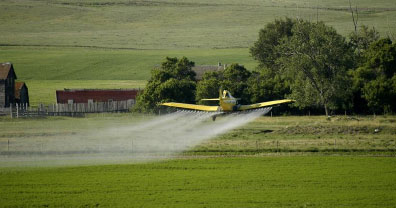 Air Quality Partnerships
Air Quality Partnerships
|
|
We do not inherit the Earth from our parents, we borrow it from our children.”
• Antoine de Saint-Exupery, Author
|
|
 |
|
|
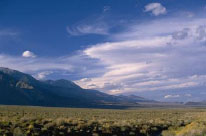 |
Central Valley Air Quality (CVAQ) Coalition
We have remained an active member of the Central Valley Air Quality (CVAQ) Coalition, made up of environmental, community, public health and environmental justice organizations and individuals from the San Joaquin Valley and around the state working to improve the region's air. The CVAQ Coalition grew out of a legislative battle in 2003 related to dairy emissions. The group focused on implementing that legislation in 2004. Now, with more than 140 members representing 70 organizations around the state, CVAQ has become the leading voice in California for improving the Valley’s air quality.
One of the cornerstones of the Foundation's work as part of CVAQ and other statewide coalitions has been legislative advocacy focused on the Valley's air pollution crisis. Over the last year, which encompassed two legislative sessions, we focused on a variety of air quality legislation from expanding the membership of the San Joaquin Valley Air Pollution Control District Board of Directors (SB 999-Machado) to enforcement of pesticide safety regulations.
In the first half of the legislative session, we worked on a successful bill prohibiting the use of experimental pesticides in schools and a bill establishing a network of air monitoring sites on the west side of the San Joaquin Valley. In 2006, during the second half of the session, CVAQ focused tremendous energy trying to pass SB 999 again, garnering support from hundreds of organizations, Valley residents, elected officials, and the media. Ultimately, the bill passed through all of its policy committees and the full Senate before failing on the Assembly floor in a close vote.
For the annual CVAQ “Clean Air Action Day,” in addition to SB 999, more than 100 Coalition members and Valley activists worked on legislation related to confined animal feeding operations (CAFOs) and pesticide use in day care facilities.
In addition to legislative advocacy, the Foundation - as part of CVAQ - was engaged in regulatory matters including the Indirect Source Rule (ISR), CAFOs, the federal Soot rule, and goods movement issues. The local Air District Board's approval of the ISR made the Valley the first place in the nation to charge builders a fee on new developments in order to mitigate air pollution.
Our partnership with CVAQ was also evident through Kirsch Foundation staff's regular participation on the Coalition’s Steering Committee. Whether helping to plan strategy meetings, moderating the list-serve, or working with other California foundations to identify funding to hire the first-ever CVAQ staff, Foundation staff was integrally involved in implementing the Coalition’s agenda.
Besides advocacy and coalition-building, CVAQ actively sought to educate policymakers and the breathing public about the San Joaquin Valley's air pollution problems through various communication outlets, including opinion-editorials, TV and radio segments, and special written reports. The Foundation also secured speaking opportunities for CVAQ members at a variety of environmental and public health-related affinity group meetings and workshops.
Lastly, in May 2006, the Council on Foundations honored the Kirsch Foundation with a Wilmer Shields Rich Bronze Award for Excellence in Communications for our report, “Clearing the Air in the San Joaquin Valley." The report, a roadmap for legislators and regulators to address the region's air quality problems, was a partnership between the Foundation and the Union of Concerned Scientists, and was supported by the CVAQ Coalition.
|
|
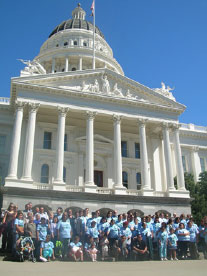
CVAQ members gather at the State Capitol for “Action Day.”
|
Statewide Advocacy
In addition to our work in the San Joaquin Valley, we maintained our focus on legislative and regulatory influence on statewide air quality issues, and did so through a number of collaborations.
Since 2002, we have held our annual “Clean Air Roundtable,” bringing together air quality advocates from around the state to talk about policy opportunities and challenges. At our 2005 summit, we galvanized around a few key issues and came up with an action agenda that included addressing petroleum dependence and global warming/climate change, and advocating for clean vehicle technologies. Kirsch Foundation staff also participated in a broad-based coalition of environmental and public health advocates, which met frequently during the legislative sessions to strategize about and collaborate on key bills.
In the first half of the legislative session, we collaborated with our colleagues on a successful bill that required the “retirement” of polluting vehicles and legislation that created a “global warming” label for new cars sold in California. We worked on legislation related to the prosecution of air quality violations and clean construction. In 2006, for the second half of the legislative session, the Foundation worked on a landmark bill that will result in a cap on stationary sources of greenhouse gas emissions and legislation that required a visible smoke test be incorporated as part of California Smog Check inspections.
|
|
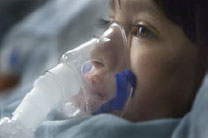
A seven-year-old San Joaquin Valley girl affected by the region’s poor air breathes through a respirator. ©FRESNO BEE, 2006
|
|
Grantmaking Partnerships
To add to the region’s air quality woes, the San Joaquin Valley suffers the lowest level of foundation support per capita compared to the rest of the state. Despite the decades-long effort of Valley activists to bring attention to the area’s pollution problems, this lack of philanthropic support made it difficult to successfully organize around these issues. Recognizing this handicap, the Kirsch Foundation began funder outreach efforts in late 2003. We identified a number of foundations, like The California Endowment, whose funding priorities matched the needs of the developing CVAQ Coalition. As a result of our work, several new foundations became engaged in supporting CVAQ’s activities and productive outreach occurred with national funder-affinity groups.
Valley-Focused Grantmaking
Between July 2005 and June 2006, the Kirsch Foundation invested over $200,000 in efforts and organizations working to improve the Valley’s air. Recipients included Fresno Metro Ministry and Latino Issues Forum, to support staff members’ time serving as CVAQ steering committee co-chairs; and the Southeast Asian Institute for Advancement, to inform the Valley’s Southeast Asian population about the air they breathe. We funded the travel and convening costs associated with the Central California Environmental Justice Network’s Annual Meeting in order to make connections among impacted, rural communities. In addition, we contributed to CVAQ’s annual “Clean Air Action Day” and critical legal efforts mounted by Earthjustice and the Center on Race, Poverty & the Environment.
|
|
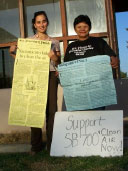
Carolina Simunovic of Fresno Metro Ministry and Teresa DeAnda with El Comite Para El Bienestar de Earlimart draw attention to clean air legislation at a rally in Alpaugh, CA. |
|
 |
|
